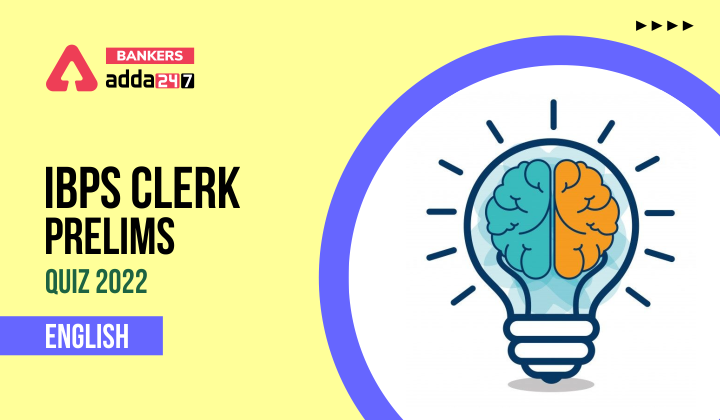
TOPIC : Miscellaneous
Directions (1-5): Rearrange the
following six sentences A, B, C, D, E and F in a proper sequence to form a
meaningful paragraph. Then answer the questions given below:-
(A) To the uninformed outsider Gandhi often appears as a
particularly Hindu public figure, one who looked backwards into India’s
religious past for inspiration.
(B) He was remarkably radical in his critique of religious
authority of modes of worship and of social customs rooted in religious
tradition.
(C) He also argued that religious texts have to be tested
against reason and conscience and that religious relation comes to each
successive generation.
(D) Not only did he use the Ashram style of community to
experiment in social equality and in a new forms of tolerant community,
(E) What is less well known and perhaps easily forgotten in
the wake of changes is the role he played in what might be called the
modernization of Hindu tradition.
(F) He there played no little part in the process which
have helped to make Hindu tradition of world wide significance in late 20th
century, freeing them from their local roots in Indian society.
Q1. Which of the following should be the FIRST statement
after rearrangement?
(a) A (b)
E
(c) B (d)
D
(e) F
Q2. Which of the following should be the FOURTH statement
after rearrangement?
(a) B (b)
D
(c) E (d)
F
(e) C
Q3. Which of the following should be the SIXTH statement
after rearrangement?
(a) E (b)
C
(c) A (d)
F
(e) D
Q4. Which of the following should be the THIRD statement
after rearrangement?
(a) E (b)
C
(c) E (d)
A
(e) B
Q5. Which of the following should be the SECOND statement
after rearrangement?
(a) A (b)
F
(c) D (d)
E
(e) B
Directions (6-10) : Read each sentence to find out whether
there is any error in it. The error, if any, will be in one part of the
sentence. Mark the number of that part with error as your answer. If there is
no error, mark (e). (Ignore errors of punctuation, if any.)
Q6. We, as the editors of (a)/ a popular magazine,
would like to (b)/ know what are other topics (c)/ on people’s
minds. (d)/ No error (e)
Q7. The smooth and easier (a)/ we allow people to
navigate (b)/ through any device at any place (c)/ in the world,
the better. (d)/ No error (e)
Q8. Asian culture will, (a)/ sooner or later, (b)/
become the international norm (c)/ for entertainment industry. (d)/
No error (e)
Q9. What really agonise them (a)/ is the presence of
(b)/ an unwanted and unscrupulous (c)/ member on the panel. (d)/
No error (e)
Q10. The business lobby wanted (a)/ he to take over (b)/
as the new chairman (c)/ of their coveted board. (d)/ No error (e)
Directions (11-15): In the following passage there are
blanks, each of which has been numbered. These numbers are printed below the
passage and against each five words are suggested, one of which fits the blank
appropriately. Find out the appropriate words.
“One thing scientists have discovered,” note Thomas Dreier,
“is that often-praised children become more … (11)… than often-blamed ones. There’s a creative element in
praise.”
Good leaders know that. Fundamentally, their job is to help
others make the most of themselves. Viewed in strictly … (12)… terms, that is their greater contribution to their
companies. People, employees, are a great untapped … (13)… of energy. Leaders who can tap this source are valuable
to any organization. It doesn’t require elaborate …(14).. to bring out the best in people. If you … (15)… their work, they’ll
probably give you the best that’s in them.
Q11. (a) adamant
(b) notorious
(c) rebellious
(d) whimsical
(e) intelligent
Q12. (a) casual
(b) useful
(c) remedial
(d) sensible
(e) commercial
Q13. (a) wastage
(b) reservoir
(c) utilization
(d) conservation
(e) consumption
Q14. (a) baits
(b) pains
(c) troubles
(d) features
(e) incentives
Q15. (a) share
(b) ignore
(c) perform
(d) recognize
(e) advertise
SOLUTIONS:
S1. Ans. (a)
Sol. The correct sequence is AEBDCF.
S2. Ans. (b)
Sol.
The correct sequence is AEBDCF.
S3. Ans. (d)
Sol.
The correct sequence is AEBDCF.
S4. Ans. (e)
Sol.
The correct sequence is AEBDCF.
S5. Ans. (d)
Sol.
The correct sequence is AEBDCF.
S6. Ans. (c)
Sol. The verb ‘are’ should follow the noun ‘other topics’.
To which it refers. The (c) part of the sentence should be ‘know what other
topics are most’.
S7. Ans. (a)
Sol. The comparative should be uniformly used. Both
adjectives ‘smooth’ and ‘easy’ should be in same form. ‘Smoother and easier’ is
the correct usage.
S8. Ans. (d)
Sol. The article ‘the’ is necessary before ‘entertainment
industry’
S9. Ans. (a)
Sol. As we are referring to ‘the presence’ of a member, a
singular verb (agonises) should be used.
S10. Ans. (b)
Sol. The pronoun should be used in the objective case
(‘him’ here) and not in the subjective case (‘he’)
S11. Ans. (e)
S12. Ans. (e)
S13. Ans. (b)
S14. Ans. (e)
S15. Ans. (d)




 English Quizzes For SBI PO Mains 2023 - ...
English Quizzes For SBI PO Mains 2023 - ...

